How to Conduct a Utah Business Entity Search
Check out our guide on searching the Utah Division of Corporations and Commercial Code website.

Last Updated: July 9, 2025
The Utah business entity search is a valuable resource for individuals who are looking to learn more about businesses registered in the state. Whether you’re a seasoned business owner looking to view documents for an established business or you’re an entrepreneur who needs to check if your desired business name is available, this search is a go-to resource.
But using the search can feel a little bit overwhelming, especially if you’ve never used a search like this. In this guide, we’ll walk you through how to run a Utah business search and a name availability search. We’ll also cover of the most important business name rules and what to do after you’ve searched a business name.
Let’s get started.
Utah Department of Commerce
Division of Corporations and Commercial Code Information
| Mailing Address: SM Box 146701 Salt Lake City, UT 84114-6701 | Physical Address: Heber M. Wells Building 160 East 300 South Salt Lake City, Utah 84111 |
| Telephone: (801) 530-4849 | Website: https://corporations.utah.gov/ |
Utah Business Name Guidelines
When you’re starting a business, one of the most important things you’ll do is pick your business name. And like other states, Utah has several rules about naming your business.
First, your name needs to be different from the names of other registered companies in Utah, including both domestic and foreign corporations, limited liability companies (LLCs), limited partnerships, and so on. This is one of the simplest but most important naming standards.
That said, uniqueness isn’t the only naming guideline to adhere to. Here are a few other rules your Utah business name should follow:
- Your business name should include a designator. For example, a corporation needs to include the words “incorporated,” “company,” “corporation,” or an acceptable abbreviation. Meanwhile, LLCs need to include the phrase “limited liability company” or “limited company” or an acceptable abbreviation. LLCs are also prohibited from using the words “corporation,” “association,” “incorporated,” or “limited partnership” in their name.
- Your name can’t state or imply that you’re conducting business activities that aren’t permissible by law or your company’s formation documents.
- The state won’t allow you to register a name that implies you’re a state agency (or affiliated with one) unless you have the appropriate authorizations.
- Your name must be translated into English or be in another language but written in standard English characters.
- Only nonprofit agricultural cooperatives are allowed to use the word “cooperative” in their name.
If you’re in a licensed trade or profession, keep in mind that you’ll need to meet any naming rules that your industry has in place, too. If your business name doesn’t meet these requirements, you’ll need to pick a new one.
How to Use the Utah Business Entity Search
The Utah business search tool is the resource you’ll use if you want to look up records or extra information for an existing business and know some of its basic information, such as its name, registered agent, entity number, or even just part of its name. If you’d like to check name availability, keep scrolling; we’ll cover that process later.
Step 1: Choose your search type and filters you want to use
To get started, navigate to the Utah business search homepage (look for “Search Business Entity Records” under “Additional Options” on the page linked above). Here, you can select how you’d like to search, and you can filter your results.
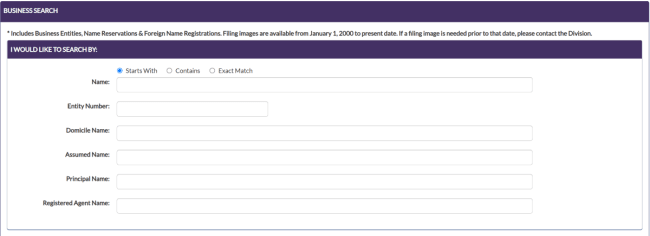
Here are the different ways you can use the basic search:
- Name: This search type is arguably the most common search, as it allows you to look up a company by all or part of the business name it has registered with the state.
- Entity Number: This search type lets you look up a company by the ID number assigned to it by the Utah Division of Corporations. As each number is unique, this search will only reveal one business result.
- Domicile Name: This search lets you look up a company by the name it goes by in its home state (which may or may not be Utah). For domestic entities, the domicile name is the same as its business name in Utah; for foreign entities, the domicile name may be different if the company name wasn’t available in the state.
- Assumed Name: If you know a company’s assumed name, you can use this search tool to look up additional information about that company.
- Principal Name: This search allows you to look up a company by the name of one of its principal individuals, such as a member on record for an LLC or an officer for a corporation.
- Registered Agent Name: This search allows you to look up a company by the name of the registered agent who represents the entity.
Many users will use just a single search type, such as the business name, but it’s possible to use multiple search types at once to help narrow down your results. For example, if you know a company’s name and the name of its registered agent, you could type both names in the respective search bar.
Note: certain search types don’t function (or don’t function well) without other search types. For example, the “Assumed Name” search needs to be paired with a primary search like a name or entity number. For the most streamlined search, it’s recommended to use the “Name” or “Entity Number” search and pair it with any additional information you know.
You can also filter any of the above search types in one of three ways:
- Starts With: This filter retrieves the results that begin with the same words as your search terms. For example, if you typed “Smith” in the business name search bar, the tool would give you a list of names that have “Smith” as the first word.
- Contains: This filter acts more like a keyword search, retrieving results that include your search terms anywhere in the name.
- Exact Match: This filter retrieves only those results that are identical to your search terms.
After you’ve selected your search terms and filters, type your search terms and hit “search.”
Step 2: Review your search results
After you hit “Search,” the tool will retrieve all the results that match your search terms. For example, when we searched the name “Smith,” our results page looked like this:
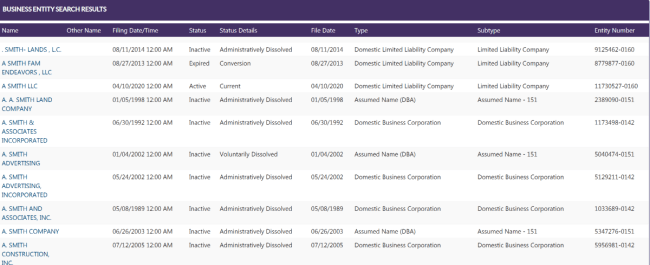
This page will show you some preliminary information about each matching result, including the company name, any other names it has, the filing date, business status, legal structure, and its entity number.
You can also click on the company name (or the entity number, if you searched that way) linked on the far left to review additional information about the company.
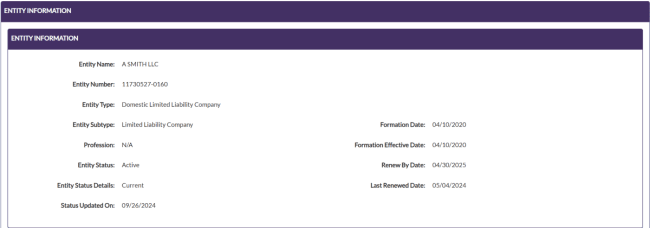
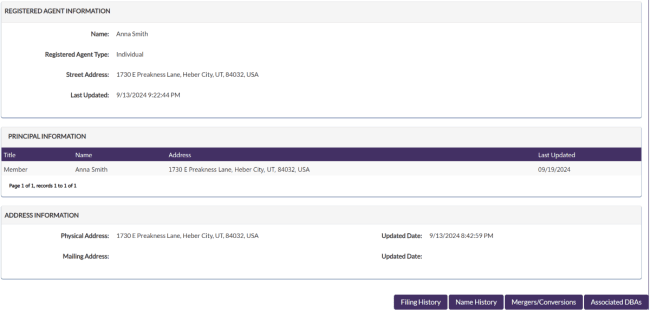
On this page, you can learn even more about a company, including its current status, when that status was last updated, and when the business was renewed. You can also scroll down to learn about the company’s registered agent, any principal information on file, and the company’s address information.
At the bottom of the page, you’ll see a series of buttons where you can review even more information. For example, if you want to review the company’s filed documents, you can hit the “Filing History” button to download forms like the company’s annual report or formation documents.
If you enter an entity number search, your results list will be a bit shorter; as long as you type the ID number correctly, you should only see one result on the results page. Here’s an example:

From this page, you can click on the company name to review additional information about the company.
How to Use the Advanced Search
Depending on how you use the basic search tool, you might find that it yields many different results. To narrow down the results further, check out the “Advanced Search Options” button at the bottom of the basic search page. That will expand the search menu significantly.
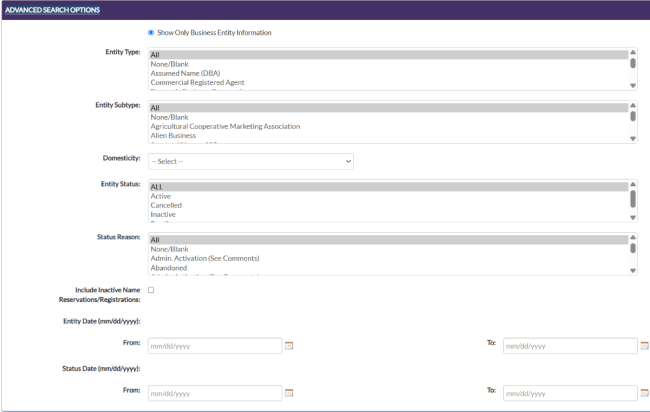
Here are the different options you can use with the advanced search:
- Entity Type: This setting can filter by certain business types, such as a DBA, name reservation, or even business structure.
- Entity Subtype: This section allows you to filter the results even further, such as narrowing “Corporation” down to “Benefit Corporation.”
- Domesticity: This lets you review results for businesses that are domestic or foreign to Utah.
- Entity Status: This lets you filter results by entities that are active, cancelled, inactive, pending, or all of the above.
- Status Reason: If you chose a specific entity status, you can further filter the results by the cause of that business status. For example, if the business you’re searching was administratively dissolved, you can sort administrative dissolutions by court order, annual report noncompliance, missed fees or penalties, or a missing registered agent.
- Entity or Status Date: If you know relevant dates for filings or status rulings for the business, you can input these here.
Last but not least, you can check or uncheck the box labeled “Include Inactive Name Reservations/Registrations” to include or exclude the related results for businesses that aren’t currently using their name reservations or registrations.
To use this advanced search effectively, pick each filter you want to use at the bottom of the page and set it appropriately. Then, head back up to the basic search tool and type in the business name you’re searching. When you hit “Search,” the advanced search tool will pull up all the results that match your search settings.
For example, let’s say that you wanted to look up a business that had “Smith” in its name. You can’t remember the full name, but you know that it’s a domestic Utah LLC and it’s active. To do that, you’d need to set the “Entity Type” setting to “LLC,” and then hit the “Active” setting underneath the “Entity Status” category. Then you’d type “Smith” into the search bar above. Here’s what the results page would look like for that search:

On the results page, you can review all the businesses that match your search criteria. You can also click on a company name to view additional information about that specific business.
How to Run a Name Availability Search
The searches we’ve covered above are great resources for established entrepreneurs or professionals who need to learn about the businesses registered with the state already. But what if you need to see if your desired business name is available?
You’ll need to run a business name availability search instead. Here’s how.
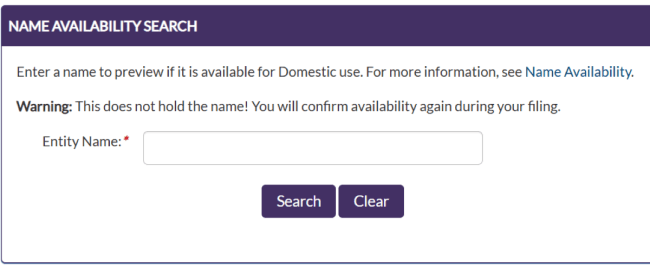
To start, type the name you’re hoping to use for your new business (without any designators like “LLC” or “Incorporated”). Then hit “Search.”
The search results will vary depending on your name’s availability. If there aren’t any registered businesses using the name you searched, you’ll get a message saying, “The name is available.”
If the name isn’t available, you’ll see a message saying that the name is unavailable. You’ll also see the business information for the company with that name. For example, if you ran an availability search for our name, “ZenBusiness,” you’d see this results page:

Keep in mind that this search doesn’t guarantee that your desired name will be available when you register your business; you’ll run another check when you reserve or register the name. Act promptly to claim your LLC name.
What to Do After Searching Business Names in Utah
After you’ve come up with a name and searched it, you’re probably feeling like you’ve done a lot of legwork. You’d hate for that hard work to go to waste, right? Here are some steps you can take to protect your Utah business name and make the most of it.
Reserve your Utah business name (optional)
If you’ve picked the perfect business name but you’re not quite ready to file your business formation paperwork, Utah allows you to reserve a business name.
You can get a Utah name reservation by filing an Application for Reservation of Business Name form with the Division of Corporations and Commercial Code. There is currently a $22 filing fee for reserving a name.
After your paperwork is filed and approved, your name reservation will be valid for 120 days. You can also renew the reservation (using the same form as above) if you need additional time. This step is optional, and you should only pursue it if you’ve picked a name but aren’t ready to file your formation paperwork yet.
Form an LLC or register your business
One of the best ways to protect your business name is to register your business. After you register a business under your chosen name, no one else in Utah will be able to register their own company with the same name.
Registering a Utah business is an important legal process. Learn more about starting a Utah LLC.
Get a domain name that matches
You want it to be easy for your customers to find your business website. That means you need a domain name that matches your business name as closely as possible. A matching domain will help your brand maintain consistency both in person and online.
If you’re struggling to come up with a domain name (or the one that matches your name is already taken), try using a domain name generator. A generator can help you come up with a domain that matches your brand image.
Set up your business online
Today, you can’t run a business without a good digital footprint. A good business website is a decent starting point. But don’t stop there; set up social media accounts like a Facebook page, a TikTok profile, and an Instagram account. Make sure your business name is included on each account so your brand is consistent across your online presence.
Last but not least, set up a Google Business Profile for your business (or claim it if it already exists). This profile will help you direct customers to your website or your store location. Plus, it’ll help you respond to customer reviews and build a good brand reputation in the Beehive State.
Trademark your business name (optional)
If you want the most robust protections for your business name, you could pursue trademark registration. Trademarks can be registered at the state or federal level (with federal protections being the strongest).
Getting a trademark can be pretty complicated and time-consuming. If you go this route, it’s highly recommended to work with a trademark attorney.
Utah Business Resources
Start an LLC in Your State
When it comes to compliance, costs, and other factors, these are popular states for forming an LLC.
Conduct an Entity Search in Your State
Disclaimer: The content on this page is for information purposes only and does not constitute legal, tax, or accounting advice. If you have specific questions about any of these topics, seek the counsel of a licensed professional.
Let's Get Started

